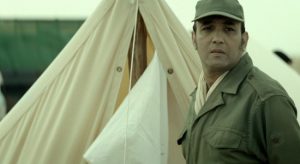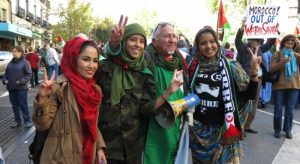The Transnational Moroccan Cinema Project collaborates with Africa in Motion in Edinburgh, to screen Moroccan films in the context of the country’s transnational identity in cinema. On 6 November 2016 we organise a double bill, centring on the topic of Western Sahara and its status as occupied territory. The screenings include a fictional account of the historical Green March and a documentary focusing on the other side of the border, on the refugee camps and the consequences of (neo-)colonialism in Western Sahara. Join us at 3:30pm in Filmhouse Cinema in Edinburgh for two film screenings and an accompanying panel discussion in which experts on film, migration, post-colonialism and Western Sahara will engage with the debates that connect these two diametrically opposed films. Guest speakers: Prof. Will Higbee, Dr. Jamal Bahmad, Dr. Alice Wilson, Prof. Noe Mendelle and Ali Bahaijoub.

Youssef Britel’s La Marche Verte is a patriotic account of 350,000 Moroccan civilians’ dramatic 1975 March into the Southern Moroccan territory of the Western Sahara. The ensemble of diverse characters has one thing in common: a deep, uncomplicated love for their country. With the Green March, these civilians crossed the country from north to south, asserting independence from Spanish occupiers. The film’s narrative tells of Massira, a woman born on the day of this historic event, who interviews Ali (Jilali Ferhati, a famous Moroccan actor and director), a retiring politician. Through flashback, history mingles with that of those on the March, describing a mix of intentions and hopes.

The second film on the double bill is Life is Waiting: referendum and resistance in Western Sahara. Most people think that colonialism in Africa has ended. But in the territory of Western Sahara, the end of European rule only gave way to a new occupation, this time by Morocco. Four decades later the Sahrawi people still face arrests, torture and disappearances for demanding their independence. Today’s young generation is deploying creative nonviolent resistance for the cause of self-determination. While risking their lives, they are also pushing back against those who have lost patience with the international community and are ready to launch another guerrilla war. Life Is Waiting chronicles this struggle and gives voice to a brave cast of Sahrawi activists and artists as they offer their points of view.